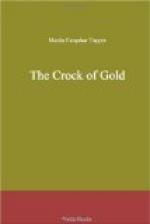In an instant afterwards, she humbly added,
“Forgive me any thing I may have said, that seems to chide my father.”
“Bless you, bless you, dearest one!” was Roger’s sobbing prayer, who had listened to her wisdom breathlessly. “Ah, daughter,” then exclaimed the humbled, happy man, “I’ll try to do all you ask me, Grace; but it is a hard thing to feel myself so wicked, and to have to speak up boldly like a Christian man.”
CHAPTER XXXVIII.
EXPERIENCE.
THEN, with disjointed sentences, suited to the turmoil of his thoughts, half in a soliloquy, half as talking to his daughter, Roger Acton gave his hostile testimony to the worth of wealth.
“Oh, fool, fool that I have been, to set so high a price on gold! To have hungered and thirsted for it—to have coveted earnestly so bad a gift—to have longed for Mammon’s friendship, which is enmity with God! What has not money cost me? Happiness:—ay, wasn’t it to have given me happiness? and the little that I had (it was much, Grace, not little, very much—too much—God be praised for it!) all, all the happiness I had, gold took away. Look at our dear old home—shattered and scattered, as now I wish that crock had been. Health, too; were it not for gold, and all gold gave, I had been sturdy still, and capable; but my nights maddened with anxieties, my days worried with care, my head feverish with drink, my heart rent by conscience—ah, my girl, my girl, when I thought much of poverty and its hardships, of toil, and hunger, and rheumatics, I little imagined that wealth had heavier cares and pains: I envied them their wanton life of pleasure at the Hall, and little knew how hard it was: well are they called hard-livers who drink, and game, and have nothing to do, except to do wickedness continually. Religion—can it bide with money, child? I never knew my wicked heart, till fortune made me rich; not until then did I guess how base, lying, false, and bad was ‘honest Roger;’ how sensual, coarse, and brutal, was that hypocrite ‘steady Acton’. Money is a devil, child, or pretty near akin. Then I complained of toil, too, didn’t I?—Ah, what are all the aches I ever felt—labouring with spade and spud in cold and rain, hungry belike, and faint withal—what are they all at their worst (and the worst was very seldom after all), to the gnawing cares, the hideous fears, the sins—the sins, my girl, that tore your poor old father? Wasn’t it to be an end of troubles, too, this precious crock of gold? Wo’s me, I never knew real trouble till I had it! Look at me, and judge; what has made me live like a beast, sin like a heathen, and lie down here like a felon? what has made me curse Ben Burke—kind, hearty, friendly Ben?—and given my poor good boy an ill-report as having stolen and slain? all this crock of gold. But O, my Grace, to think that the crock’s curses touched thee, too! didn’t it madden me to hear them? Dear, pure, patient child, my darling, injured daughter, here upon my knees I pray, forgive that wrong!” And he fell at her feet beseechingly.




